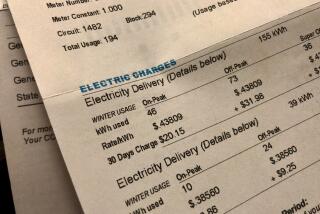Pac Bell Figure on Overcharges May Be Low : Telecommunications: A consumer group says the improper late fees may total $20 million. The state says $93.8 million. The firm says up to $7 million.
Pacific Bell owes its customers millions of dollars in refunds for improper late payment charges levied between 1988 and 1990, a prominent consumer group and a division of the state Public Utilities Commission said Tuesday.
In separate reports to the PUC, San Francisco-based Toward Utility Rate Normalization said Pacific Bell should refund customers $20 million in overcharges, while the state Division of Ratepayer Advocates said Pacific Bell should return $93.8 million to consumers.
The figures are significantly higher than Pacific Bell’s estimates. In March, the state’s largest phone company disclosed that it had collected between $1.2 million and $3.5 million in improper late charges during 1990. Pacific Bell has refunded about $2 million of that to 175,000 customers.
On Tuesday, Pacific Bell said that, although it does not know how much money it may have improperly collected from its customers during 1988 and 1989, it is unlikely that the amount exceeds $7 million.
Pacific Bell spokesman Michael Runzler said TURN and the Division of Ratepayer Advocates “are really overestimating the facts.”
The overpayments represent a tiny fraction of Pacific Bell’s 1990 revenue of $8.65 billion. The company said it took in $50 million in late charges in 1990.
The PUC is expected to hold hearings on the improper late charges next February.
Pacific Bell said the problem was caused by delays in processing telephone bills. The company said that because of staffing shortages, some payments received on time were not processed until after the date for late fees. The fees are 1.5% of the total on bills above $20.
The company said the snafu mostly involved payments mailed by customers in plain envelopes instead of those provided by Pacific Bell. Those account for 13% of payments received.
TURN and the Division of Ratepayer Advocates said documents provided by Pacific Bell indicate that the company knew of the problem in 1988 but did little to correct it.
“There was a corporate culture that discouraged bad news (and) in which upper layers of management did not hold employees accountable on issues involving customers,” said David Schantz, an analyst at the Division of Ratepayer Advocates.
Schantz said he believes that Pacific Bell is now processing bills in a timely manner.
More to Read
Inside the business of entertainment
The Wide Shot brings you news, analysis and insights on everything from streaming wars to production — and what it all means for the future.
You may occasionally receive promotional content from the Los Angeles Times.










